Home → Fish & Wildlife → Fish and Wildlife in Captivity → Purchasing or Possessing Wildlife in Maine
Purchasing or Possessing Wildlife in Maine
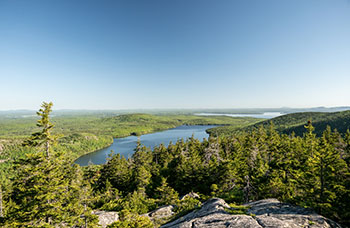
On this page:
- Protect our Wildlife and Habitat from Invasive Species
- Why should I care?
- Ways you may encounter invasive species
- What can be done?
- Invasive species that have entered Maine, and what to do if you find them
Learn about the laws pertaining to the purchasing or possession of wildlife in Maine before acquiring an animal or bringing one into the state when you move. Bringing a non-permitted or invasive species into the state may be illegal and can have detrimental impacts to native species.
If you see or suspect any invasive species/insects in the wild, as a personal possession, or see them being sold at a store, contact the Maine Warden Service immediately at 1-800-ALERT-US or report the offense at MaineOGT.org
Protect our Wildlife and Habitats from Invasive Species
Maine has some of the East's healthiest waters, woods, and wildlife, supporting high-quality habitat for fish and wildlife and endless opportunities for outdoor recreation.
Unfortunately, Maine's environment, as well as the fish, wildlife, and recreation they support, are threatened each year by the accidental or intentional introduction of invasive fish, wildlife, plants, and diseases that compete with and displace native natural communities.
Why should I care?
Once an invasive species has become established, it is extremely difficult to eradicate. Control measures are costly, often unsuccessful, and introductions have the potential to change natural places and the way we enjoy them forever.
Ways you may encounter invasive species:
- Buying Online: There are hundreds of online retailers that sell to individuals or businesses, but just because it's for sale online, doesn't mean it's legal in Maine. There are many animals and insects we don't allow the sale of to prevent the decline of protected species, or there is clear evidence the species would harm the environment and other wildlife.
- At Pet Stores, Garden Centers and Big Box Stores, Livestock, or Farm Supply Stores: There have been cases of stores in Maine selling invasive species – this is illegal and is often done unintentionally. That's why the more people who know the threat invasive species pose, the better we can all work together to protect our native species. Many insects are known as "beneficial" and are sold as pest control but can often cause problems for our native pollinators. Insects can also be sold as food for other pets but if released into the environment, could become established and harmful. Examples of these common but illegal insects sold in stores are praying mantids, ladybugs, bumblebees, dragonflies, damselflies, lacewings, nematodes, and more.
- In the Wild: In many cases, insects and worms have made their way to Maine accidentally through the shipment of food, firewood, plants, and other avenues. They unknowingly hitch a ride with the importation of plants and animals and are introduced into the environment when something is planted or placed on the property.
What can be done?
Prevention is key. It's our duty as those who enjoy Maine's natural resources to become informed, attentive, and accountable for our potential role in the spread of invasive species and to take steps to protect Maine's woods and waters.
- Before purchasing wildlife from the internet or pet stores, verify that doing so is legal -- most wildlife importations are prohibited without a permit from MDIFW. Unfortunately, it is common for stores to sell species that are not native to Maine and can have harmful impacts if they are introduced into the environment. To determine whether a species being sold is allowed in the state of Maine, reference the Unrestricted Species List (PDF). If a species is not listed on the Unrestricted Species List, it is automatically prohibited.
- Never release any animal or insect you've purchased from a store or the internet into the wild. Rather, contact a biologist at MDIFW for guidance on species fate.
- Follow the Laws: Don't bring firewood across state lines, NEVER purchase OR catch species in one location and release it in another.
- Report any species for sale that you suspect is problematic to MDIFW.
- To learn how to prevent the spread of aquatic invasive species, such as plants, mussels, and fish when fishing, boating, or paddling in Maine, please visit our aquatic invasive species website page.
Invasive species that have entered Maine, and what to do if you find them:
Praying Mantids
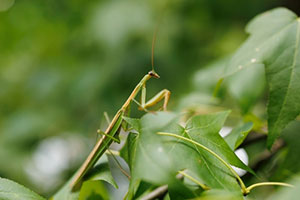
Although there are some exotic praying mantids that are well-established in some areas, no mantids are native to Maine. The sale of these species is prohibited to help prevent introduction of mantids to new areas of the state.
Mantids are sometimes toted as a natural pest control agent, and an alternative to chemical sprays. However, according to Maine entomologists, mantids are not efficient tools for pest management and may have a negative effect on native pollinators such as butterflies, bumblebees, and other beneficial insects.
What you can do:
- If you purchased a mantid or mantid eggs, soak the egg sack in rubbing alcohol
- If you find a mantid in your garden or outside, there is no need to kill the mantid as they are unlikely to increase populations at a rate that will be harmful to Maine ecosystems as long as more are not purchased and released into the wild.
- Promote native beneficial insects; lacewings, assassin bugs, tachinid flies, and pollinators are all advantageous to your garden (Video: Attracting Bees and Beneficial Insects with Native Plants)
- Increase the diversity of your landscape
- Provide some shelter for native species such as leaf debris, decaying wood, and undisturbed soil
- If you see or suspect praying mantids being sold at a store, contact the Maine Warden Service immediately at 1-800-ALERT-US or report the offense at MaineOGT.org
Jumping Worms
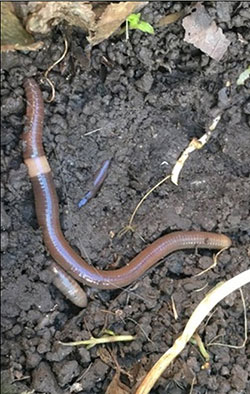
Photo by Maine Forest Service / Brittany Shappach
Believe it or not, there are no native earthworms in Maine. While they are often useful for improved aeration and nutrition in gardens, they can be destructive to forests. Jumping worms (Amynthas) are native to East Asia and cause significant destruction to forested landscapes through their rapid life cycle and ability to reproduce (asexually), have a very aggressive appetite, and are much more active then typical nightcrawlers. They are often sold as bait or for composting under a variety of names even though it is illegal to import or possess them.
Amynthas worms accelerate the decomposition of leaf litter on the forest floor, causing good soil to get dry and grainy due to a high production of castings (worm poop) that doesn't support native plants, fungi or invertebrates. Ultimately, a decline of native species begins and is incredibly difficult to reverse. You can learn more about jumping worms through the Maine Department of Agriculture, Conservation and Forestry.
What you can do:
- DO NOT squish it or cut it up – it will just make more planarians (worms)!
- Place it in a bag and freeze it for up to 48 hours, or leave it in soapy water
- Do not buy or use Amynthas worms for composting, gardening or as bait
- Do not discard live worms in the wild (such as after fishing) – dispose of them in the trash (preferably dead)
- Report suspected jumping worms
- If you see or suspect jumping worms being sold at a store, or in plant soil being sold at a store, contact the Maine Warden Service immediately at 1-800-ALERT-US or report the offense at MaineOGT.org
Hammerhead Worms
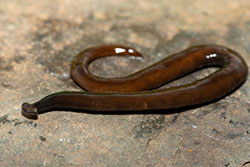
Another invasive species to keep an eye out for is the hammerhead worm from Southeast Asia. It is actually a planarian or flatworm. They are long, have hammer-shaped heads, use asexual reproduction to replicate, and prey on earthworms. They can also cause irritation to human skin and make pets sick if ingested. If hammerhead worms become established in Maine, we may see a disruption of the soil nutrients and structure and impacts on tree and plant growth.
What you can do:
- DO NOT squish it or cut it up – it will just make more planarians (worms)!
- If you see hammerhead worms in the wild, help us track their locations by uploading observations to iNaturalist.
- Place it in a bag and freeze it for up to 48 hours, or leave it in soapy water
- Do not discard live worms in the wild – dispose of them in the trash (preferably dead)
- If you see or suspect hammerhead worms being sold at a store, or in plant soil being sold at a store, contact the Maine Warden Service immediately at 1-800-ALERT-US or report the offense at MaineOGT.org
Zebra Mussels
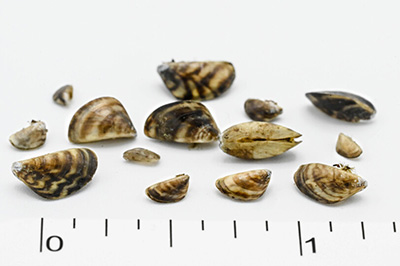
When zebra mussels were discovered in the Saint John River in New Brunswick, Canada and its tributaries, it was quickly recognized that the infestation could spread to Maine waters and result in irreversible negative impacts on native species of mussels and fish by consuming resources that native organisms require. Zebra mussel larvae are microscopic and can easily hitch rides on the hull of boats and other equipment, making it easy to translocate to other areas. MDIFW has been taking proactive measures to prevent the spread of zebra mussels by testing bodies of water for zebra mussel DNA and encouraging active monitoring from the community.
What you can do:
- Clean off visible aquatic plants, animals and mud from your watercraft, motor, trailer and equipment prior to entering and before leaving water access sites
- Drain all water from watercraft in an area where the drained water will not enter any water body
- Dry all equipment before reuse
- If you see or suspect the introduction of zebra mussels into a body of water, or you see them for sale in a store, contact the Maine Warden Service immediately at 1-800-ALERT-US or report the offense at MaineOGT.org